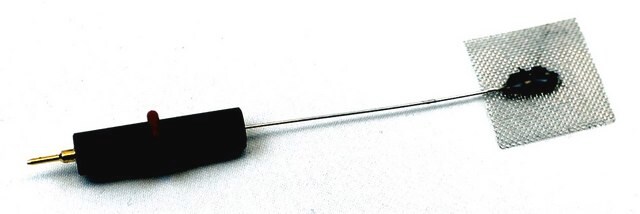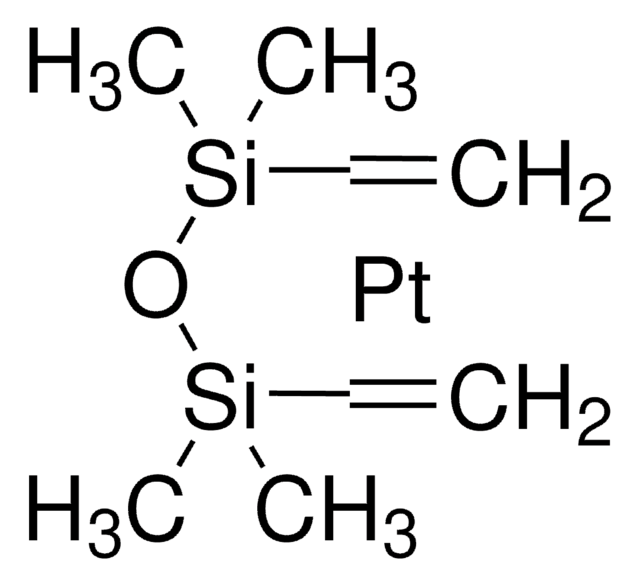Wszystkie zdjęcia(1)
Key Documents
267228
Platinum
wire, diam. 0.5 mm, 99.9% trace metals basis
Synonim(y):
Platinum element, Platinum gray
Zaloguj sięWyświetlanie cen organizacyjnych i kontraktowych
About This Item
Wzór empiryczny (zapis Hilla):
Pt
Numer CAS:
Masa cząsteczkowa:
195.08
Numer WE:
Numer MDL:
Kod UNSPSC:
12141734
Identyfikator substancji w PubChem:
NACRES:
NA.23
Polecane produkty
Poziom jakości
Próba
99.9% trace metals basis
Postać
wire
rezystywność
10.6 μΩ-cm, 20°C
Średnica
0.5 mm
tw
3827 °C (lit.)
mp
1772 °C (lit.)
gęstość
21.45 g/cm3 (lit.)
ciąg SMILES
[Pt]
InChI
1S/Pt
Klucz InChI
BASFCYQUMIYNBI-UHFFFAOYSA-N
Opis ogólny
Platinum (Pt) is a highly ductile, malleable and unreactive metal. It is resistant to corrosion and stable at high temperatures. Although resistant to hydrochloric and nitric acid, it dissolves readily in hot aqua regia to form chloroplatinic acid.
Zastosowanie
Platinum wire finds major applications as an electrode, such as:
- Auxiliary electrode in flow cell to determine ammonia content.
- Electrodes for photoconductive stimulation of neurons cultured on silicon wafers.
- Electrode to give current flow in electrophoresis chamber for ion migration.
- As a microelectrode-indicator electrode in voltammetry.
- As a transvascular embolic agent.
- To study chronopotentiometry of hydrogen peroxide with a platinum wire electrode or
- In gas detection instruments.
Ilość
1 g = 25 cm; 4 g = 100 cm
This page may contain text that has been machine translated.
Kod klasy składowania
13 - Non Combustible Solids
Klasa zagrożenia wodnego (WGK)
nwg
Temperatura zapłonu (°F)
Not applicable
Temperatura zapłonu (°C)
Not applicable
Wybierz jedną z najnowszych wersji:
Masz już ten produkt?
Dokumenty związane z niedawno zakupionymi produktami zostały zamieszczone w Bibliotece dokumentów.
Klienci oglądali również te produkty
Karl Crowley et al.
The Analyst, 133(3), 391-399 (2008-02-27)
A sensor for the amperometric detection of aqueous ammonia was fabricated using the inkjet printing of dodecylbenzene sulfonate (DBSA)-doped polyaniline nanoparticles (nanoPANI) onto a screen-printed carbon paste electrode. The combination of the environmentally inert, aqueous nanoparticle dispersion with the inkjet
Voltammetry with Stationary Microelectrodes of Platinum Wire.
Laitinen HA and Kolthoff IM
The Journal of Physical Chemistry, 45(7), 1061-1079 (1941)
Shai Rozen et al.
Plastic and reconstructive surgery, 131(6), 1253-1265 (2013-05-30)
Left untreated, paralytic lagophthalmos may result in corneal dryness, ulcerations, and subsequent blindness. The most common nondynamic surgical solution is upper eyelid weight placement in a superficial, pretarsal pocket, carrying the risk of visibility, extrusion, and entropion. The authors present
Wei Sun et al.
Materials science & engineering. C, Materials for biological applications, 33(4), 1907-1913 (2013-03-19)
In this paper a platinum (Pt) nanoparticle decorated graphene (GR) nanosheet was synthesized and used for the investigation on direct electrochemistry of myoglobin (Mb). By integrating GR-Pt nanocomposite with Mb on the surface of carbon ionic liquid electrode (CILE), a
Loris De Cecco et al.
PloS one, 8(3), e58849-e58849 (2013-03-14)
We recently reported that peritumoral CpG-ODN treatment, activating TLR-9 expressing cells in tumor microenvironment, induces modulation of genes involved in DNA repair and sensitizes cancer cells to DNA-damaging cisplatin treatment. Here, we investigated whether this treatment induces modulation of miRNAs
Nasz zespół naukowców ma doświadczenie we wszystkich obszarach badań, w tym w naukach przyrodniczych, materiałoznawstwie, syntezie chemicznej, chromatografii, analityce i wielu innych dziedzinach.
Skontaktuj się z zespołem ds. pomocy technicznej




